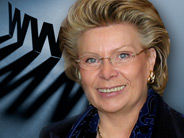Web 2.0 means power and responsibility

Viviane Reding, European Commissioner for Information Society and Media, was addressing the first meeting of the Internet Governance Forum (IGF) on Tuesday.
 Viviane Reding, European Commission |
The IGF, a U.N.-sponsored "forum for multi-stakeholder policy dialogue" was established last year after governments failed to agree on the management of the Internet's structure--a task that falls to the U.S.-based non-profit Internet Corporation for Assigned Names and Numbers (ICANN).
While acknowledging that the Internet had its roots in the developed world, particularly in Europe and the US, Reding told delegates that "given its decentralized nature, the Internet is now becoming truly the "people's Internet" across the world, moving at the moment clearly towards a Web 2.0 direction in which every Web citizen will become at the same time a creator of Web content.
"Individuals thus contribute directly to Internet content and innovation themselves and, as citizens, they have an increasing interest in participating in the debate about how the Internet can and should be run. This also increases the need to raise awareness on security issues and make all citizens and businesses part of a more efficient chain of responsibility," Reding added.
The US government recently shifted its position on the subject of ICANN, signing a new agreement with the organization that meant it no longer had to report back regularly to the US Department of Commerce (DOC), although it will still have to liaise with DOC officials from time to time.
Although the agreement has been touted as providing a greater degree of autonomy for ICANN, some people have argued that it could still allow the U.S. government to have undue influence over the future of the Internet. The European Commission, however, has welcomed the move.
"We see this joint project undertaking as a very important step in the direction of full privatization of ICANN," Reding's spokesman Martin Selmayr told ZDNet UK on Wednesday. "We see a clear intention here to move towards a more flexible framework and we welcome in particular the declared intention of the U.S. administration that this is the last memorandum of understanding with ICANN and we will see an end of it [soon].
"In 2009 ICANN will be free--that is what we have always advocated," Selmayr added.
Selmayr also referred to Reding's Wednesday meeting with ICANN's president and chairman, Paul Twomey and Vint Cerf, saying that the Commissioner was taking the opportunity to reiterate the EC's view that "government should have an advisory role, but should not interfere with the day-to-day management of the Internet".